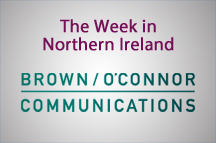 Allegations of sexism in NI politics reached fever pitch again this week when a seemingly innocuous ‘word association’ game delivered a news story and social media frenzy that got an election-weary public talking about politics – and more specifically the relationship between two leading female politicians here.
Allegations of sexism in NI politics reached fever pitch again this week when a seemingly innocuous ‘word association’ game delivered a news story and social media frenzy that got an election-weary public talking about politics – and more specifically the relationship between two leading female politicians here.
The publication of an article by Niamh Horan in The Sunday Independent saw DUP leader Arlene Foster coaxed into playing the word association game that resulted in her describing Sinn Féin northern leader Michelle O’Neill as ‘blonde’. Much has been made of the episode and what exactly was meant by it. The DUP leader maintains it was a compliment, whilst others say it was intentional and derogatory. Whatever it was, it placed a spotlight firmly on the women at the helm of the two largest political parties.
Within hours, the hashtag ‘blondegate’ grew legs on social media and Sinn Féin responded with memes of cartoon crocodiles in blonde wigs, urging voters to ‘bite back’ on June 8th. The crocodile reference relates to an earlier comment from Foster on the Irish language lobby here.
 An earlier handshake between the two leaders at the funeral of former deputy First Minister Martin McGuinness was encouraging to those of us who would like to see a functioning Executive back at Stormont, however this week’s events have poured cold water on any notion of a developing spirit of collegiality between the two leaders, and hope of an agreement by the end of June looks like wishful thinking.
An earlier handshake between the two leaders at the funeral of former deputy First Minister Martin McGuinness was encouraging to those of us who would like to see a functioning Executive back at Stormont, however this week’s events have poured cold water on any notion of a developing spirit of collegiality between the two leaders, and hope of an agreement by the end of June looks like wishful thinking.
In a BBC interview this week, Foster has reiterated that she would like to see devolution restored as soon as possible, however Sinn Féin say it will not support her as First Minister until the investigation into the Renewable Heating Incentive scandal is complete. O’Neill, when pressed in an earlier BBC interview said that would ‘take as long as it takes’.
The upcoming General Election will be the latest in what feels like a never-ending stream of elections, and will serve as yet another test of both women’s leadership skills in a very short space of time. Political negotiations around a new Executive have been put on hold until the end of June. That means division will dominate politics here until the results are in on 9th June - leaving a lot of room for further friction and adversarial politicking in the meantime.
Whatever the outcome of the election, both leaders and their parties will have to put their differences aside to present a united front for Northern Ireland at Brexit negotiations. A stronger Conservative Government will mean the DUP have less influence at Westminster, so NI will need to do all it can to avoid a hard Brexit and severe restrictions on the border. Is it possible that Foster and O’Neill can put differences and recent events aside and present a united front on Brexit?












